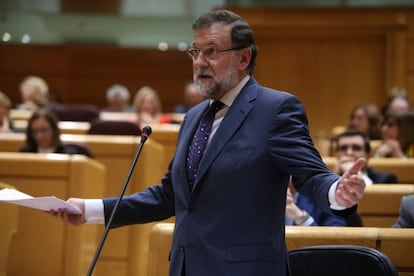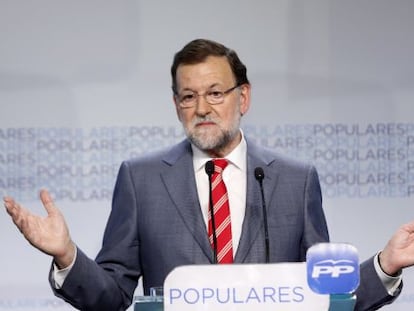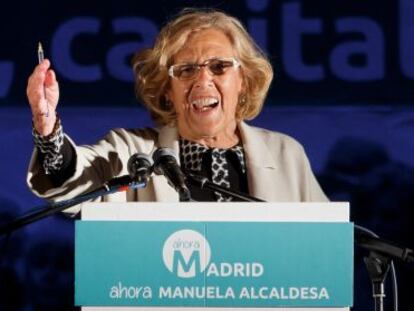PP veterans planning to make way for new faces following election losses
But PM sees no need for major reforms despite widespread call for profound changes In Madrid, conservative mayoral nominee sounds out Socialists to keep leftist out of office

The fragmented scenario that emerged from Sunday’s municipal and local elections is already causing tectonic shifts in Spanish politics.
With four main players now present in many city councils and regional assemblies, and no absolute majorities for any one of them, the Popular Party (PP), Socialist Party (PSOE), Ciudadanos and Podemos are racing to set the rules for possible investiture deals that will propel some candidates into office and see others forced out.
The PP had its difficulties at these elections, but it was still the most voted force above and beyond your own”
PM Mariano Rajoy to the Socialists
In key places such as the Spanish capital, the strong performance by new leftist bloc Ahora Madrid is even pushing the incumbent conservatives to consider a deal with their traditional arch-rivals, the Socialists, in order to keep the Podemos-backed party from running Madrid City Hall.
A PP-PSOE pact in Madrid?
Meanwhile, what may transpire in the city of Madrid in the coming days remains a mystery. Even national PP leaders admit that Esperanza Aguirre’s next steps “are unpredictable.” The PP contender for the mayor’s office narrowly won the election but is widely expected to be kept out of office by a coalition of Socialists and Ahora Madrid, a left-wing bloc supported by Podemos.
Aguirre, a notoriously outspoken party veteran who was regional premier and now heads the Madrid PP, will only give up the latter post if she is voted in as mayor, sources familiar with the situation said. Otherwise, not even a personal request by Rajoy himself would convince her to go.
In the meantime, Aguirre has already met with the Socialist mayoral candidate Antonio Miguel Carmona, and suggested that she is willing to back his candidacy, Socialist sources said. She would also consider a joint PP-PSOE vote in favor of Ciudadanos candidate Begoña Villacís. Anything to leave Ahora Madrid’s Manuela Carmena out of office.
Carmona himself said that his reply was “a resounding no.”
Meanwhile, the PP’s significant loss of voter support has triggered a groundswell of criticism within party ranks. Several high-ranking regional leaders are asking for a generational change and pondering their own departure to facilitate this internal overhaul.
Yet Prime Minister Mariano Rajoy continues to focus on the fact that the PP was the most-voted party on Sunday, regardless of its heavy losses, and sees no need for major reforms.
“The PP had its difficulties at these elections, but it was still the most-voted force above and beyond your own,” he told the Socialists during a Senate appearance on Tuesday. “I don’t know when the Socialists will ever get to power, but if your results are like Navarre, where you came in fifth, it’s going to be quite a while.”
An internal cry for change
One PP veteran, Juan Vicente Herrera, who has been the regional premier of Castilla y León for the last 11 years, confessed on the radio network Onda Cero that he is considering resigning, and suggested that Prime Minister Mariano Rajoy should do the same.
Asked whether Rajoy is still the best candidate to lead the PP at general elections in the fall, Herrera replied: “I would tell Rajoy, ‛Look in the mirror and answer yourself.’”
The leaders of large regions such as Valencia, Castilla-La Mancha and Aragón are also planning their own succession, and anticipating an internal debate over the need for a profound regeneration in the PP. The premier of Castilla-La Mancha, María Dolores de Cospedal, is also the party’s secretary general.
So far, however, Rajoy is rejecting any need for reform, saying that the only required steps are to “be closer, and communicate more, with Spaniards.”
Another longtime party official, Luisa Fernanda Rudi, now the outgoing premier of Aragón, said that while she was happy that the PP was overall the most-voted force in Spain, “the PP brand is currently causing rejection.” Herrera added that party leaders are coming across as “unlikeable,” which is the best way to lose an election.
Alberto Fabra, the Valencian premier, is expected to be the first regional leader to publicly announce his resignation after the PP lost its absolute majority there on Sunday. Valencia, a stronghold of conservative power for decades, has been particularly hard hit by corruption scandals involving PP officials. Fabra has stated that the Valencian PP should “take note” of its electoral defeat and prepare an emergency action plan.
Faced with Rajoy’s refusal to address change, some party leaders are choosing to go it alone.
“We are going to change whatever we need to change: style, form, strategies, and also faces, in order to live up to what citizens are asking of us,” said Juan Manuel Moreno, president of the Andalusian PP.
Even Ana Botella, the outgoing mayor of Madrid and wife to former prime minister José María Aznar, contributed to the debate by saying she hopes the party will soon take the necessary corrective measures.
Tu suscripción se está usando en otro dispositivo
¿Quieres añadir otro usuario a tu suscripción?
Si continúas leyendo en este dispositivo, no se podrá leer en el otro.
FlechaTu suscripción se está usando en otro dispositivo y solo puedes acceder a EL PAÍS desde un dispositivo a la vez.
Si quieres compartir tu cuenta, cambia tu suscripción a la modalidad Premium, así podrás añadir otro usuario. Cada uno accederá con su propia cuenta de email, lo que os permitirá personalizar vuestra experiencia en EL PAÍS.
En el caso de no saber quién está usando tu cuenta, te recomendamos cambiar tu contraseña aquí.
Si decides continuar compartiendo tu cuenta, este mensaje se mostrará en tu dispositivo y en el de la otra persona que está usando tu cuenta de forma indefinida, afectando a tu experiencia de lectura. Puedes consultar aquí los términos y condiciones de la suscripción digital.










































